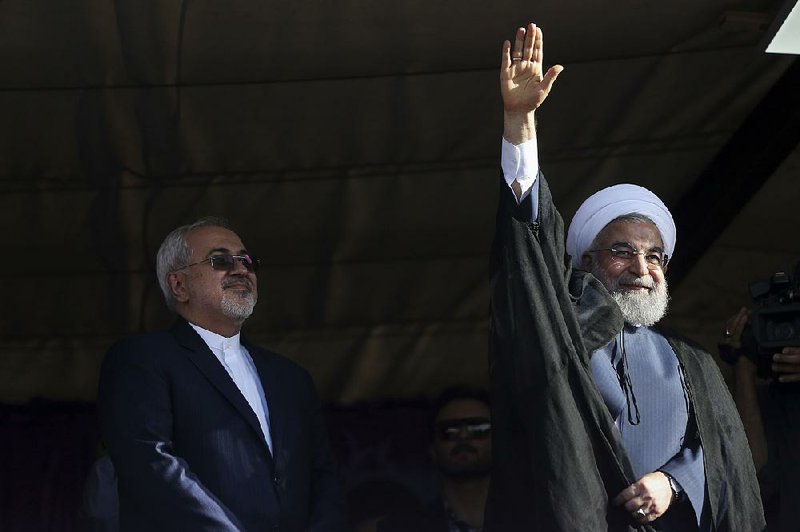WASHINGTON -- President Donald Trump's administration took a key step Wednesday toward preserving the nuclear deal with Iran, coupling the move with fresh sanctions for ballistic-missile work to show it isn't going light on the Islamic republic.
The State Department said Iran would continue to receive relief from decades-old economic measures punishing Tehran for its nuclear program. Under the 2015 nuclear agreement, the U.S. lifted those sanctions. But Washington must issue periodic waivers to keep the penalties from snapping back into place, and the most recent one was set to expire this week.
Trump as a candidate vowed to renegotiate or tear up the nuclear deal. As president, he has altered his position, insisting that he is still studying the accord and hasn't made a final decision.
The U.S. paired the announcement with new, unrelated sanctions that go after Iran for a ballistic missiles program that Washington fears could target U.S. interests in the Middle East or key allies such as Israel and Saudi Arabia.
Wednesday's sanctions target Iranian military officials along with an Iranian company and China-based network accused of supplying Iran with materials for ballistic missiles, the State Department said.
The dual moves -- ensuring old sanctions on Iran don't return while imposing new ones -- appeared aimed at undercutting the impression that Trump's stance on Iran has softened since he took office.
Stuart Jones, the top U.S. diplomat in charge of the Middle East, said the U.S. is still forming a "comprehensive Iran policy" that includes Iran's support for Syrian President Bashar Assad's government and militant groups in Lebanon, Iraq and Yemen.
"This ongoing review does not diminish the United States' resolve to continue countering Iran's destabilizing activity in the region, whether it be supporting the Assad regime, backing terrorist organizations like Hezbollah, or supporting violent militias that undermine governments in Iraq and Yemen," Jones said. "And above all, the United States will never allow the regime in Iran to acquire nuclear weapons."
In a similar move last month, Trump's administration certified to Congress that Iran is complying with the terms of the deal -- a requirement for Iran to keep receiving the economic benefits of the deal. At the same time, Trump dispatched Secretary of State Rex Tillerson to issue a scathing critique of Iran in which he also cast doubt that the nuclear deal would achieve its objective of keeping Tehran from developing nuclear weapons.
On Wednesday, Iranian state media outlets said four passenger airplanes were being delivered as the first installment of a deal with French-Italian manufacturer ATR that was finalized after the nuclear agreement. Iran is buying 20 of the ATR 72-600 planes. It also has clinched bigger deals with trans-Atlantic rivals Airbus and Boeing.
Under the 2015 deal, the U.S. and other world powers eased sanctions after the U.N.'s International Atomic Energy Agency confirmed that Iran had taken a series of steps to pull its nuclear program back from the brink of weapons capability.
The deal doesn't prohibit the U.S. or other countries from imposing new sanctions on Iran for its missile program, terrorism or other reasons, although Tehran has threatened to pull out of the deal if the U.S. and other countries do so.
In another attempt to ramp up pressure on Tehran, the State Department released a new report criticizing Iran for human-rights abuses, including its alleged mistreatment of prisoners.
As contentious as the 2015 Iran nuclear deal is in the U.S., it has been even more divisive in Iran.
On Friday, Iranian voters will decide whether to give a second four-year term to incumbent Hassan Rouhani, whose negotiation on the nuclear deal was supposed to put him on a glide path to re-election.
Instead, the nuclear agreement's failure to lift the economy is at the heart of a surprisingly strong challenge from Ebrahim Raisi. He is a conservative cleric backed by the Islamic Revolutionary Guard Corps and the paramilitary Basij, security forces that wield sizable political and economic clout. Hints dropped by Supreme Leader Ali Khamenei, the ultimate power in Iran, suggest he favors Raisi, too.
But Raisi, considered a potential successor to Khamenei, has gained ground by accusing Rouhani of not capitalizing on the agreement and, by extension, blaming him for the deepening poverty and rising unemployment afflicting a country that is awash with oil deals since nuclear sanctions were lifted. He has pledged to triple government subsidies, currently $12 a month for the poorest Iranians.
All five remaining candidates in the race have said they would uphold the nuclear deal. Rouhani has gone further, vowing to end all remaining sanctions still imposed for human-rights abuses, ballistic missile tests and terrorism support. His re-election would be welcomed by Europeans who desire more business dealings with Tehran and who likely would resist or ignore any U.S. efforts to slap nuclear sanctions back on Iran.
"The deal won't go anywhere next week," said Suzanne Maloney, an Iran analyst at the Brookings Institution. "If it's undercut by Iranian rejection of what the deal brought, it will be more difficult to anticipate it enduring more than months."
The election will occur just before Trump leaves on an eight-day trip to Europe and the Middle East, with his first stop in Saudi Arabia, a bitter regional rival of Iran.
Information for this article was contributed by Josh Lederman of The Associated Press and by Carol Morello of The Washington Post.
A Section on 05/18/2017
